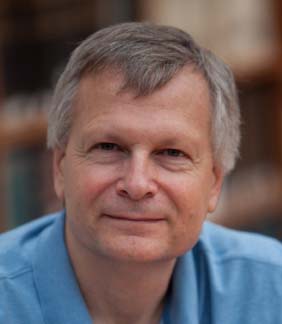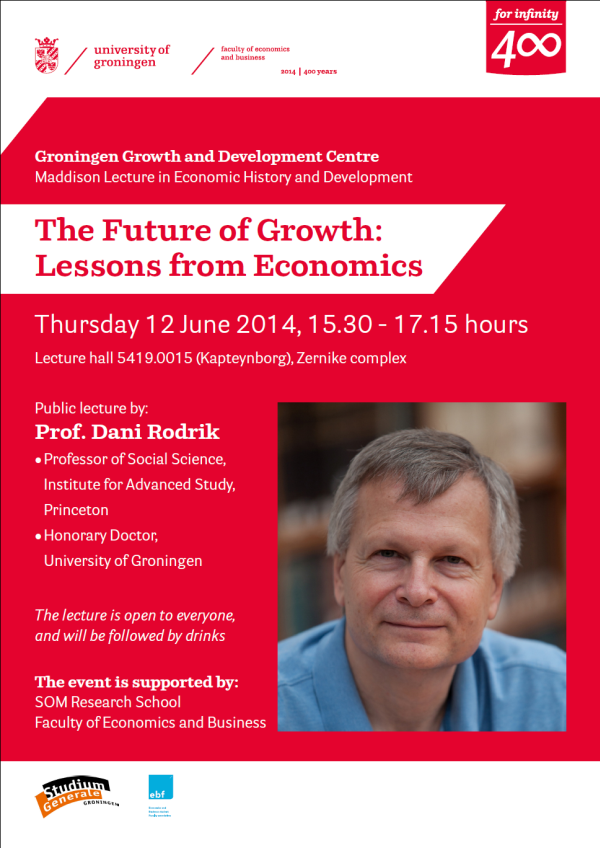Alternative way to think about economic development | 12 June 2014 | Public lecture Dani Rodrik, new Honorary Doctor at FEB

Most economists nowadays agree that the level of economic development of a country ultimately depends on the quality of its government and the skills of its workforce. Yet, the examples of China and some Latin American countries do not seem to fit the theory. Dani Rodrik, one of the world’s leading economic thinkers, proposes an alternative way to think about the process of economic development. He will give a public lecture on Thursday 12 June 2014 on the occasion of his Honorary Doctorate in economics and business at the University of Groningen.
Rodrik is Professor of Social Science of the Institute for Advanced Study at Princeton. He will receive an honorary doctorate during the celebration of "University of Groningen 400 years". Honorary doctorates are presented to individuals who have made exceptional contributions to society, academia or politics. During his visit to Groningen, professor Rodrik will give the public lecture on Thursday 12 June. The honorary doctorate ceremony will take place on Friday.
Lecture on economic development
Claiming that the level of economic development of a country ultimately depends on the quality of its government and the skills of its workforce seems not to be in line with practice: the fast economic development of China and other East Asian countries does not seem to be simply the result of superior governance and high workforce skills. Similarly, the experiences of several Latin American countries since the 1990s has shown that focusing solely on political and educational reforms does not necessarily produce rapid economic growth.
To account for these experiences, Prof. Rodrik will propose an alternative way to think about the process of economic development. He will claim that there are two drivers of economic growth in developing countries.
The first is the “accumulation of fundamentals”, namely the build-up of workforce skills and the improvement of government institutions. The second is “structural change,” namely the movement of labor from traditional to modern sectors of the economy. Achieving a high level of prosperity in the long-run requires the former. Yet, rapid economic growth can only come from a swift process of structural change.
Moreover, as Rodrik will explain, the set of policies that can improve the fundamentals may not always be appropriate to promote structural change and trigger fast growth. He will also discuss what this view of economic development implies for the future of growth in the developing world and in particular in the world’s poorest region, Sub-Saharan Africa.
► Thursday 12 June 2014, 15.30-17.15 hours
► Lecture hall 5419.0015, Kapteynborg (J), Landleven 12, Groningen
► Free Admission, drinks afterwards
About Dani Rodrik
Dani Rodrik is the Albert O. Hirschman Professor in the School of Social Science of the Institute for Advanced Study in Princeton. He has published widely in international economics and globalization, economic growth and development, and political economy. He is the author of “The Globalization Paradox: Democracy and the Future of the World Economy” (Norton, 2011) and “One Economics, Many Recipes: Globalization, Institutions, and Economic Growth” (Princeton, 2007).
This lecture, part of the Maddison Lecture series, is organized by the Groningen Growth and Development Centre of the Faculty of Economics and Business in co-operation with Studium Generale Groningen and the Economics and Business student Faculty association (EBF).

| Last modified: | 01 February 2023 09.52 a.m. |
More news
-
18 April 2024
Ward Romeijnders appointed as Professor of Optimization under Uncertainty
The Faculty of Economics and Business is pleased to announce that Ward Romeijnders has been appointed as Professor of Optimization under Uncertainty. The chair is situated within the Department of Operations.
-
12 April 2024
Inaugural Lecture Corine Noordhoff: Future ready retail
In her inaugural lecture, Professor of Retail Marketing Corine Noordhoff will provide insights in the cornerstones for survival and adaptation in the retail sector. Noordhoff’s inaugural lecture will take place on Friday 19 April 2024, 16:15 –...
-
09 April 2024
New issue FEB Research Newsletter
We are proud to present the spring 2024 edition of the FEB Research Newsletter.
